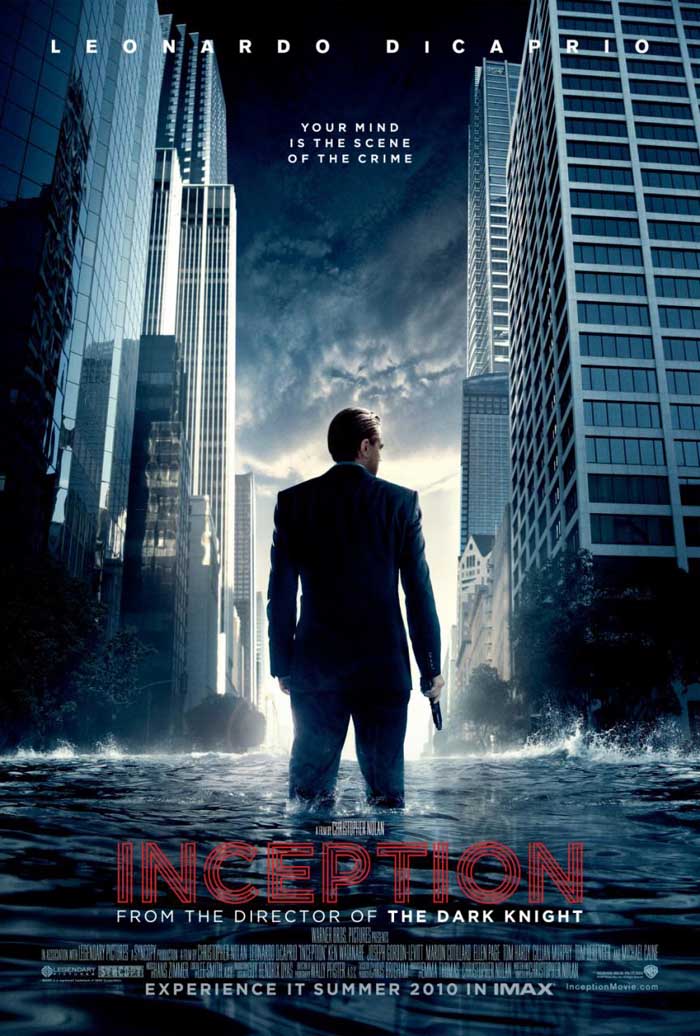Previously on A Tiff With Christopher Nolan...: Through a specific dissection of The Prestige, I extracted what I see as Nolan's common theme—that is, (middle-aged, male) self-delusion & the dangers of fiction-made-real.
With that in mind, once more unto the breach, dear Reader; I promise, I've done my very best to stay coherent.
Part 2: Along Comes Inception.
On the surface, it would seem that Inception fits squarely into the Nolanesque mold I've described—perhaps even epitomizes it: protagonist Cobb (Leonardo DiCaprio) muddles through illusion imposed upon illusion with his ragtag crew, all the while fighting off his own mental demons. Indeed, the basic tenets of the formula remain intact—a focus on the power of the mind, the leading man's self-deception—but ultimately, it's only enough to convince me that my Christopher did, in fact, have something to do with this wooden mess. From where I'm standing, Inception lacks any of the self-referential depth that characterized each of his previous endeavors—&, in that way, is an utter disappointment, precisely because it had the potential to be his most poignant film yet.
But I'm getting ahead of myself. Let me first say that yes, this film is stunning—truly a technical marvel, the kind for which movies were meant. I'm a sucker for cinema as spectacle, & Inception doesn't disappoint: Paris flips over on itself, Joseph Gordon-Levitt kicks ass in an anti-gravity Bingo roller, on & on until your eyeballs ooze over. Really—it's distinctly visually pleasurable.
Unfortunately, this is perhaps my only positive comment; even such basic points as casting & characterization somehow went hopelessly awry. Was I alone in feeling absolutely no chemistry between DeCaprio & Cotillard? DeCaprio & Page? Page & anybody? Was anyone able to sympathize with any of these characters—to see them as more than two-dimensional sketches dutifully cranking the gears from sight gag to sight gag?
More pressing, though, than these superficial complaints is what I see as an unforgivable thematic oversight: that is, just how little this film about dreams has to do with the actual experience of dreaming. For example: When you dream, do you remember—much less bring with you, sentiently—the items you had in your pocket? Would you wake up if tumbled more than 360˚ in a car crash? Honestly, it even seems to me against the very nature of dreams that someone else should be able to construct them for you. I understand that the thrust of the film is to create seamless Realities within Realities, thereby harking back to some basic Cartesian skepticism (How can we ever really know we're not dreaming??!), but I would argue that the figure of a separate Architect forces the film to castrate its own concept—that what makes dreams interesting at all is how rooted they are in the specific unconscious of the dreamer.
Because dreams are, in a sense, the ultimate self-delusion: in sleep, your mind free-associates, finding proxies for your anxieties, hopes, fears, casting them around in a ghoulish half-light to form a playful rehash of your daily experience. For this reason, dreams tend to be utterly personal, often unrecountable, & rarely sensical in the least. Again, I understand that, for the purposes of the film, it was necessary to render them slightly more causal, more life-like, but I still think that there could have been a more effective middle ground. If, for example, Ariadne was asked to trail the Cillian Murphy character in order to better understand the kinds of structures he's used to seeing; if she had to steal his journal, engage him in a conversation, run him through some MacGuffinish scanning machine, even—anything to show that the dreams she creates are necessarily specific to their dreamer—then I would at least have been partially appeased. As it stands, Inception's "dreams" are ultimately no more than planes (or, honestly, videogame levels)—mere canvases on which action is allowed to play out. & thus, in my opinion, is a huge opportunity wasted—for poignance, for depth & mindfuckery, for traditional Nolanesque genius—because what quotidian illusion is more dream-like than film?
Whereas The Prestige used its magical subject matter both to entertain & to comment on the nature of entertainment—the nature of its own medium—Inception refuses to take this obvious leap, except in tiny, momentary glimmers. Consider the scene in which Cobb first teaches Ariadne about Dream Architecture: We open on a shot of the two at an unremarkable Parisian café, rehearsing various plot points. Halfway through the conversation, though, Cobb stops & asks Ariadne if she remembers how they got to where they are. Page's face scrunches, Juno-like: she can't remember—&, of course, neither can we. We take the language of film so for granted that when this scene cut in from the former, we automatically inferred their travel to this point. & so, too, in dreams—as Cobb goes on to remind her (& us)—does scene mesh against scene, often without direct explanation.
In a moment of generousness, I think I can see my favorite symbolic trend straining towards Inception's surface: with a not insubstantial reach, one might say that films are our Shared Dream, the director our Primary Dreamer & our Architect, all in one. We viewers enter his world, play by his rules, & together have a common peek inside his head. Still, even this shaky inference pales in comparison to the film's latent potential—what I legitimately expected from the moment I first saw the trailer:
Imagine, for instance (as I did, in my jittery anticipation), that, at some point in the film, Cobb realized his whole life as a dream-thief on the run was itself a dream—if, rather than going deeper & deeper into a reality we know is constructed, then returning to the level on which we began, we backed out a few steps from what was presented to us at first. Wouldn't that raise some far more provocative questions about the reliability of our perception—both as human beings & as moviegoers?
Memento's ultimately unreliable narrator implicitly invites us to call our filmic perception into question, thereby heartily bamboozling us several times over, & Inception seems to want to do the same (or perhaps even more), but it never quite gets there—that is, until the absolute last second, when Cobb's top just barely wobbles before the screen goes black. "Was it all a dream?!" we're meant to gasp, but by then, it's too little too late. I understand the appeal of movies that leave you thinking—revel in them, in fact—but I pity the film that does so at the expense of taking this complexity on as real subject matter, & all for the sake of a cheap pun: that Inception is itself an act of inception, with Nolan as the agent, planting the question of Reality in the heads of his viewers.
For my part, I like to imagine that there is a grand & beautiful secret being thrust upon the unwitting masses: Inception is, in fact, Cobb's dream—but not this Cobb: the impossibly cunning thug of the same name from Nolan's debut film, Following. This Real Cobb—who, in his film's final shot, disappears unrecognized into the bustle of a London street—is feeling guilty about his life of crime & betrayal, his devotion to his boss, the loves & friendships he's damned in order to maintain his mercenary autonomy. So, one night, he sleeps uneasy: he dreams that he's an American on the run who must destroy a patriarchal company, that his past crimes will somehow out unwittingly to those around him—that he can never escape his life of grifting & self-imposed illusion. Following-Cobb concerns himself so intimately with the fact that everyone keeps a physical box of personal mementoes; it's not the world's biggest stretch to see this "box" replicated psychically in Inception-Cobb's Elevator of Regret.
Sure, it's highly implausible, but who knows. It's just a thought, after all: that fantastical parasite, gnawing at my brainstem—the dream I've constructed for myself to counteract this otherwise crushing letdown.
Today's Headphone Fodder:
Gravity—Nico Vega.
I first heard of Nico Vega the night I saw them, accidentally—opening for Semi Precious Weapons at that show I so raved about—& it was, without question, Love Instantaneous. They are simply brilliant: heavy rock aesthetic with powerhouse female vocals, lyrics just to the left of obscure. This song in particular is dangerously close to Perfect: quick, raw, no punches pulled. Speaking of which: the video is also pretty excellent.


